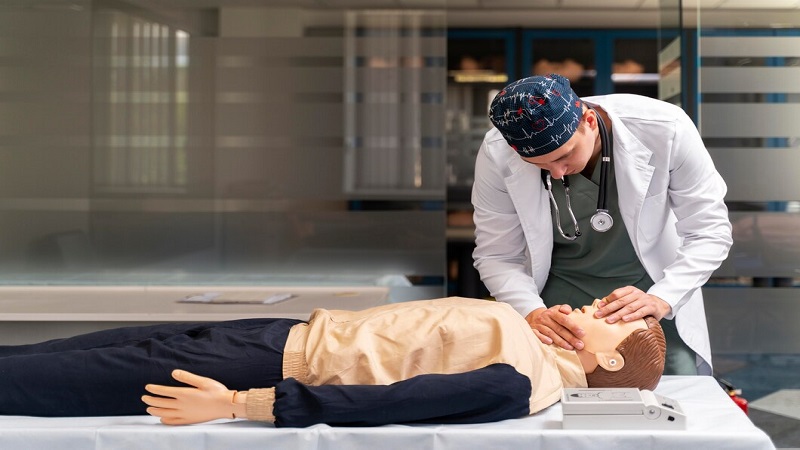Emergencies are unpredictable, and when they strike, the ability to respond quickly and effectively can mean the difference between life and death. In those critical moments, panic often takes over, leaving many feeling helpless. However, a first aid course equips you with essential knowledge, skills, and the confidence to take control and provide immediate care. By learning first aid, you not only prepare yourself to help others in need, but you also empower yourself to remain calm and act decisively. This article will explore in detail how First Aid Courses Ottawa can empower you in emergencies, covering the various ways it enhances your ability to make a real difference during crises.
1. Learning the Fundamentals of First Aid
The foundation of a first aid course lies in teaching you the basics of medical care that can be applied in various emergencies. From minor injuries like cuts and bruises to more severe conditions such as fractures, burns, or even cardiac arrest, first aid training gives you the tools to provide immediate help. You’ll learn about wound care, how to bandage injuries properly, and how to manage bleeding or sprains.
More advanced topics, like handling choking incidents, performing CPR (cardiopulmonary resuscitation), and using an AED (automated external defibrillator), are integral parts of first aid training. Mastering these essential skills is the first step in how a first Aid course can empower you in emergency situations. It allows you to respond effectively in a variety of scenarios where every second counts, ensuring that you can stabilize the situation before professional help arrives.
Moreover, the training emphasizes practical knowledge through hands-on demonstrations, allowing you to practice these techniques repeatedly until you feel confident in your abilities. This comprehensive approach ensures that the theoretical knowledge you gain can be applied in real-life situations.
2. Developing the Confidence to Act Under Pressure
Confidence plays a crucial role in emergency situations. When an accident or medical crisis happens, those who are untrained often freeze due to fear or uncertainty. A first aid course, however, transforms this reaction by building your confidence through structured training. You learn how to stay composed and act decisively, even when emotions are high.
The practical exercises and simulations you experience during the course help you become comfortable with managing emergencies. The more you practice, the more natural it becomes to remain calm and think clearly under pressure. This is a vital part of how a first Aid course can empower you in emergency situations, as you are far less likely to panic, and far more likely to respond appropriately.
By understanding the steps involved in treating injuries or life-threatening conditions, you gain a sense of control over the situation. Confidence not only empowers you but also reassures those around you, helping them stay calm as well. Whether you’re dealing with a severe injury or a minor accident, your ability to take charge can inspire others to trust in your actions.
3. Strengthening Decision-Making and Critical Thinking Skills
Emergencies often require quick thinking, sharp judgment, and the ability to make informed decisions in seconds. One of the key components of how a first Aid course can empower you in emergency situations is the training you receive in assessing the scene, prioritizing care, and acting swiftly.
For instance, if you encounter multiple victims, you’ll need to use triage skills to determine who needs immediate assistance and who can wait. This decision-making process is crucial in emergencies where time is limited. The course will teach you how to evaluate the severity of injuries, decide on the best course of action, and administer appropriate care, all while staying calm under pressure.
These skills are transferable to many other areas of life. The ability to make sound decisions in high-stress situations enhances your overall problem-solving capabilities, which can benefit you in both personal and professional settings.
4. Offering Immediate Care in the Critical “Golden Hour”
The concept of the “Golden Hour” refers to the critical time immediately following a traumatic injury or medical emergency, during which prompt medical intervention is most likely to save a life. In many cases, the time it takes for emergency services to arrive can be longer than this crucial window. This is where your first aid skills come into play.
Being able to offer immediate care during this critical time can prevent the situation from worsening and potentially save a life. For example, knowing how to perform CPR on someone in cardiac arrest can keep oxygen circulating to their brain and vital organs until professional medical assistance arrives. Similarly, knowing how to treat severe bleeding can prevent a person from going into shock.
This ability to intervene quickly and appropriately is one of the strongest examples of how a first Aid course can empower you in emergency situations. It enables you to act as the first line of defense in critical moments, ensuring you take life-saving measures when they are needed most.
5. Promoting Personal and Public Safety
A first aid course is not only about treating injuries; it also emphasizes personal safety and awareness of potential hazards. You’ll learn how to evaluate your surroundings and ensure that the environment is safe for both yourself and the victim before administering aid. This aspect of the training helps you avoid becoming a victim yourself, which can happen if you rush into a dangerous situation unprepared.
For instance, the course will teach you how to protect yourself from bloodborne pathogens, handle chemicals, and move injured people safely to prevent further harm. A first aid course empowers you in emergency situations by providing the knowledge to maintain personal safety while offering help, ensuring you are always prepared for any hazards you may face.
Moreover, learning how to keep yourself safe extends beyond emergencies. You become more aware of potential risks in everyday life and are better equipped to prevent accidents before they occur.

6. Staying Prepared and Ready to Respond
Emergencies can occur in various settings, whether at home, work, or in public spaces. By taking a first aid course, you ensure that you are always prepared to handle whatever situations arise, no matter where you are. For example, at home, you might need to treat a burn from cooking or deal with a child who has fallen and injured themselves. In the workplace, you could be the first responder to a colleague suffering from a medical emergency such as a heart attack or an allergic reaction.
First aid training makes you adaptable and ready to act no matter the location, and that’s another reason how a first Aid course can empower you in emergency situations. You’ll learn how to stock and maintain a first aid kit, ensuring you have the tools and supplies necessary for basic medical treatment. Whether at home, in the car, or at your workplace, having access to a well-stocked first aid kit is vital in being prepared.
7. Becoming a Valuable Asset to Your Community
First aid training doesn’t just benefit you personally; it makes you a valuable asset to those around you. By acquiring these life-saving skills, you become a resource for your family, friends, coworkers, and even strangers. When you know how to respond in an emergency, you’re able to provide immediate care and prevent panic, potentially saving lives in the process.
Communities with more individuals trained in first aid are safer and more resilient. Whether it’s a minor injury or a life-threatening condition, the ability to provide timely care can improve outcomes for everyone involved. This sense of responsibility and readiness is a powerful example of how a first Aid course can empower you in emergency situations by allowing you to make a positive impact on your community.
8. Empowering You to Save Lives
Perhaps the most profound way how a first Aid course can empower you in emergency situations is by giving you the ability to save lives. The knowledge and skills you gain can prevent a tragedy, whether it’s performing the Heimlich maneuver on someone who’s choking, stopping a severe bleed, or helping someone who’s experiencing a heart attack.
The skills you learn in first aid don’t just empower you to help in obvious medical crises. They also allow you to recognize warning signs before things escalate, such as identifying the symptoms of a stroke or heart attack early, giving you the opportunity to act before the condition worsens.
When you save a life, the impact is immeasurable. You’re not just helping one person; you’re impacting their family, their friends, and their future. The empowerment that comes from having this ability is one of the most valuable things a person can possess.
9. Contributing to Lifelong Learning and Continued Growth
First aid training doesn’t stop with a single course. Many organizations that provide certification encourage continuing education and renewal of skills every couple of years. This ongoing process ensures that you stay up to date with the latest techniques, advancements in medical care, and any changes in best practices.
Through continued learning, you remain confident in your abilities to respond to emergencies, and this aspect of how a first Aid course can empower you in emergency situations ensures that you never lose touch with these critical skills. It fosters a mindset of preparedness, encouraging you to always be ready for whatever comes your way.
Conclusion
How a first Aid course can empower you in emergency situations is about much more than learning a set of skills—it’s about gaining the confidence, knowledge, and preparedness to take action when it matters most. Whether it’s providing immediate care, staying calm under pressure, or becoming a valuable asset to your community, first aid training gives you the tools to make a difference in any emergency. By investing in first aid education, you empower yourself to protect the people you care about and to potentially save lives.
